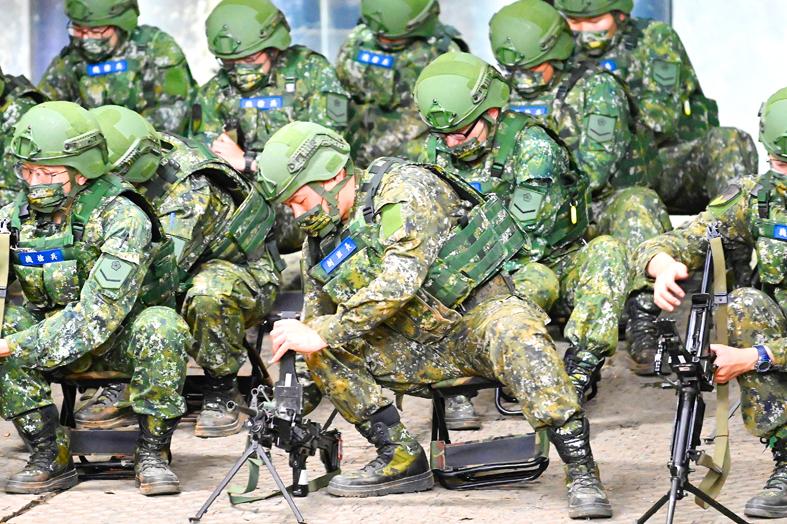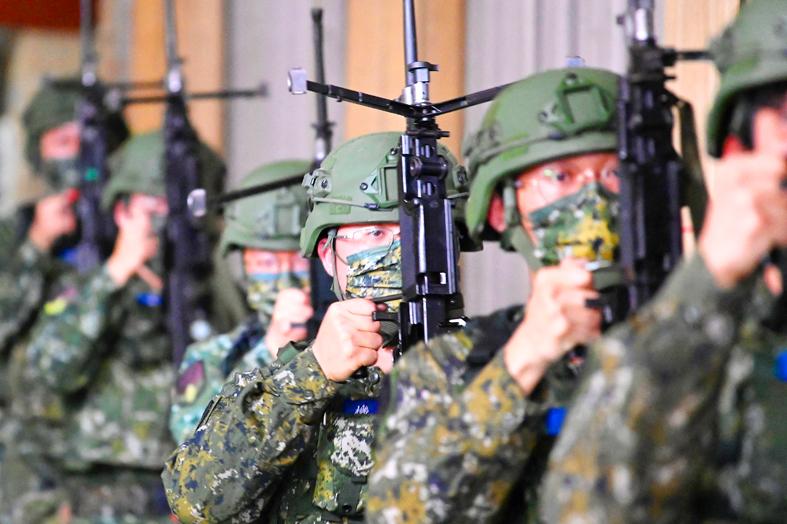The government is to assess whether the military conscription period needs to be lengthened to bolster Taiwan’s defense capabilities, Executive Yuan spokesman Lo Ping-cheng (羅秉成) said yesterday.
Minister of the Interior Hsu Kuo-yung (徐國勇) on Monday told lawmakers that the measure could be vital to the nation’s ability to deal with existential threats.
Ukraine’s resistance against Russian aggression has been an inspiration to Taiwanese and a reminder that the nation’s survival is predicated on the will to defend it, Lo told a news conference following the weekly Cabinet meeting in Taipei.

Photo: Sam Yeh, AFP
The government’s focus is to augment the military reserve by creating mobilization plans and reservist training programs via the All-Out Defense Mobilization Agency, which was activated in January, he said.
However, the government acknowledges that there is a consensus among Taiwanese to extend military conscription and re-evaluate Taiwan’s military system, he said.
The support for conscription is evidence that Taiwanese are united in their resolve to defend the nation’s democracy, he said, adding that the government would proceed with this in mind.

Photo: Sam Yeh, AFP
The Ministry of the Interior and the Ministry of National Defense would examine the viability of proposals to extend military service, he said.
Separately yesterday, Democratic Progressive Party (DPP) Legislator Tsai Shih-ying (蔡適應) at a meeting of the legislature’s Foreign Affairs and National Defense Committee asked Deputy Minister of National Defense Bo Hong-hui (柏鴻輝) when his ministry could be expected to make a decision on lengthening conscription.
A decision to change the terms of military conscription must originate from the whole of government and the defense ministry is not prepared to discuss the issue of its own volition, Bo said.
The assessment should not take more than a year, he said.
Meanwhile, Chinese Nationalist Party (KMT) Legislator Liao Wan-ju (廖婉汝) and DPP Legislator Lin Ching-yi (林靜儀) told defense officials at the meeting that a civil defense pamphlet issued by the defense ministry is too brief and has unrealistic instructions.
Instruction to scan QR codes to get information about air raid shelters is questionable, as cell towers and Internet services are likely be targeted in a war, Liao said.
The defense ministry’s pamphlet contains virtually no practical advice for people to survive a war, whereas a Latvian civil defense booklet has 15 pages of useful material, Lin said.
The first edition of the defense ministry’s pamphlet was published to establish first principles, Bo said, adding that no specific instructions can be published before it discusses and tests ideas with local governments.
The annual Wan An air raid drill this year would provide one occasion for the government to gain a clearer picture about what civil defense strategies would be effective, he said.

A magnitude 5.6 earthquake struck off the coast of Yilan County at 12:37pm today, with clear shaking felt across much of northern Taiwan. There were no immediate reports of damage. The epicenter of the quake was 16.9km east-southeast of Yilan County Hall offshore at a depth of 66.8km, Central Weather Administration (CWA) data showed. The maximum intensity registered at a 4 in Yilan County’s Nanao Township (南澳) on Taiwan’s seven-tier scale. Other parts of Yilan, as well as certain areas of Hualien County, Taipei, New Taipei City, Taoyuan, Hsinchu County, Taichung and Miaoli County, recorded intensities of 3. Residents of Yilan County and Taipei received

Taiwan has secured another breakthrough in fruit exports, with jujubes, dragon fruit and lychees approved for shipment to the EU, the Ministry of Agriculture said yesterday. The Animal and Plant Health Inspection Agency on Thursday received formal notification of the approval from the EU, the ministry said, adding that the decision was expected to expand Taiwanese fruit producers’ access to high-end European markets. Taiwan exported 126 tonnes of lychees last year, valued at US$1.48 million, with Japan accounting for 102 tonnes. Other export destinations included New Zealand, Hong Kong, the US and Australia, ministry data showed. Jujube exports totaled 103 tonnes, valued at

TRUST: The KMT said it respected the US’ timing and considerations, and hoped it would continue to honor its commitments to helping Taiwan bolster its defenses and deterrence US President Donald Trump is delaying a multibillion-dollar arms sale to Taiwan to ensure his visit to Beijing is successful, a New York Times report said. The weapons sales package has stalled in the US Department of State, the report said, citing US officials it did not identify. The White House has told agencies not to push forward ahead of Trump’s meeting with Chinese President Xi Jinping (習近平), it said. The two last month held a phone call to discuss trade and geopolitical flashpoints ahead of the summit. Xi raised the Taiwan issue and urged the US to handle arms sales to

BIG SPENDERS: Foreign investors bought the most Taiwan equities since 2005, signaling confidence that an AI boom would continue to benefit chipmakers Taiwan Semiconductor Manufacturing Co’s (TSMC, 台積電) market capitalization swelled to US$2 trillion for the first time following a 4.25 percent rally in its American depositary receipts (ADR) overnight, putting the world’s biggest contract chipmaker sixth on the list of the world’s biggest companies by market capitalization, just behind Amazon.com Inc. The site CompaniesMarketcap.com ranked TSMC ahead of Saudi Aramco and Meta Platforms Inc. The Taiwanese company’s ADRs on Tuesday surged to US$385.75 on the New York Stock Exchange, as strong demand for artificial intelligence (AI) applications led to chip supply constraints and boost revenue growth to record-breaking levels. Each TSMC ADR represents